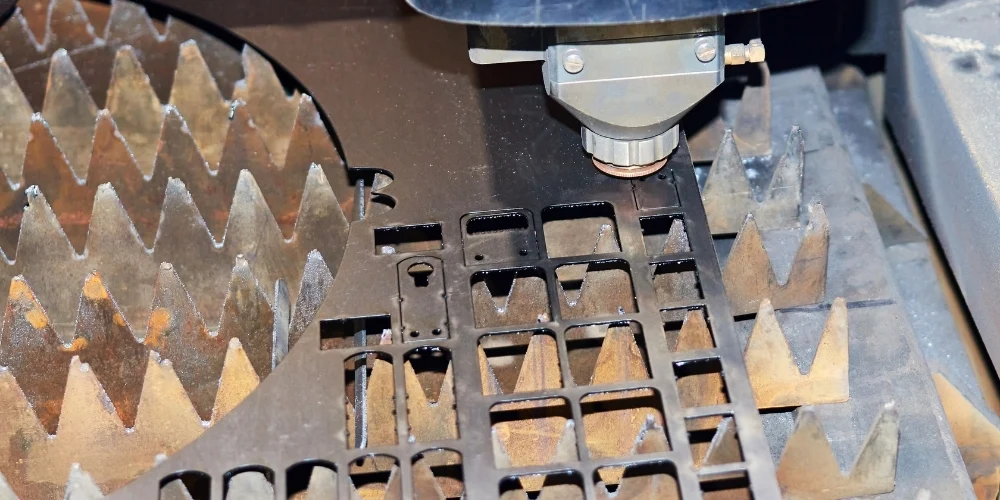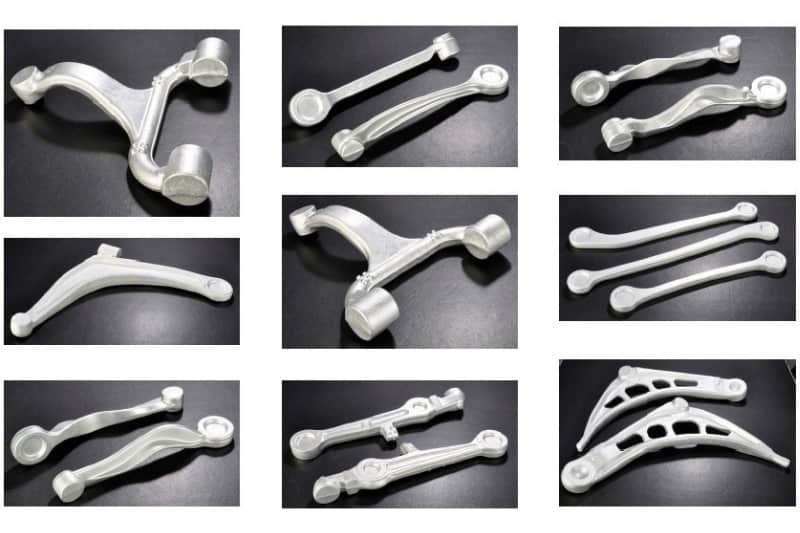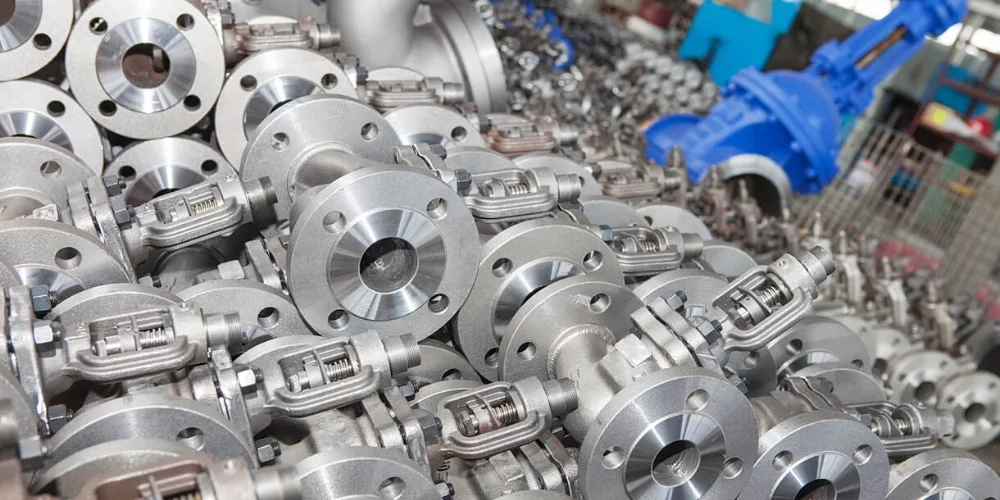
Overview
HDC, is your eminent hub for tailored fabrication of metallic components, boasting a wealth of ten years’ proficiency. Our avant-garde production facilities showcase cutting-edge 4-axis and 5-axis machining centers, complemented by sophisticated scrutiny apparatus like Coordinate Measuring Machines (CMMs). HDC takes great pride in an array of machining alternatives, encompassing CNC machining, casting, forging, laser cutting, and metal stamping.
Delving into the realm of 42CrMo4 Steel Machining, HDC emerges as a steadfast ally laden with abundant expertise. Our adept team harnesses the most recent technologies and refined methodologies, ensuring the zenith in processing 42CrMo4 steel. Whether entailing intricate detailing or robust structural elements, HDC stands primed to dispense precision and eminence in 42CrMo4 steel machining.
Unveil the myriad prospects with HDC as your entrusted collaborator in the realm of 42CrMo4 steel machining. Our unwavering dedication to excellence, fortified by years of industry acumen, guarantees that your custom metal components align with the utmost standards. Connect with HDC today and let us be your preeminent choice for all facets of 42CrMo4 steel machining.
[toc]
What is 42CrMo4 Steel?
42CrMo4 steel is the one of the frequently used alloy steel that characterized by its high strength, great toughness, and good hardenability. It is certtainly a chromium-molybdenum one that is characterized by the European standard EN 10083-3 The “42” stands for the approximate carbon content which is 0.42% (carbon), while CrMo means chromium (Cr) and molybdenum (Mo) are added as alloying components. This steel is in demand where elevated tensile strength is required, such as in gears, shafts, axles, connecting rods, heavy duty machinery components and so forth. 42CrMo4 steel could be thermally processed to achieve desired mechanical properties, which would include increased hardness and wear resistance. It is normal to supply it in the quenched and tempered condition that produces a hardened microstructure that meets the extreme demands for various applications in car, aircraft, and manufacturing fields.
What Are the Other Names for 42CrMo4 Steel?
The 42CrMo4 steel known for its high strength, toughness, and hardenability bears as many names as international standards and industrial practice have. Refereed to as 1.7225 steel in the European Union, commercially referred to as SCM440 steel in Japan, it is an engineering structural steel. In the United States, the steel is sometimes referred to as 4140 steel, even though it does not entirely correspond in composition, it possesses similar properties and applications. In the end, all trade names are a reference to the same Cr-Mo steel alloy widely used in industries that demand robust materials for such applications like gears, shafts, axles, and heavy duty components of machinery.
The Limitations of 42CrMo4 Steel
Although boasting some outstanding mechanical attributes, 42CrMo4 steel has weak points which also need to be considered. Weldability can be difficult because of its high hardenability, and thus a need for preheating and post-weld heat treatments to avoid the crack formation. Machining might also have some problems especially in the hardened condition since the adjustment of suitable parameters and tool materials would be demanded to be carefully made. On the other hand, the steel steel cost can be high compared to low-alloy steel alternatives because of the alloying of chromium and molybdenum. Compared to plain carbon steels, 42CrMo4 provides a reasonable corrosion resistance, but the corrosion resistance still does not compete with stainless steels or other special alloys. Such limitations put into relief the fact that strict application requirements should be taken into account and that untrimmed components made of 42CrMo4 steel must be used properly for the best performance of these components.
Chemical Composition of 42CrMo4 Steel
42CrMO4 steel is strong, hardenable heat-treatable steel with good machinability, strength, wear resistance, toughness, and poor weldability, recognized as an excellent alternative to expensive alloys, like chrome-nickel and chrome-nickel-molybdenum steels. It is commonly used for parts of automotive, armament, mechanical engineering, and more required to be worn, bent, and load. 
| Component | Wt.% |
| Carbon (C) | 0.38 – 0.45 |
| Chromium (Cr) | 0.90 – 1.20 |
| Manganese (Mn) | 0.60 – 0.90 |
| Molybdenum (Mo) | 0.15 – 0.30 |
| Phosphorus (P) | 0.0 – 0.025 |
| Silicon (Si) | 0.0 – 0.40 |
| Sulfur (S) | 0.0 – 0.035 |
| Iron (Fe) | Balance |
The Influence of Chemical Composition on the Properties of 42CrMo4 Steel
The mechanical performance of 42CrMo4 steel is remarked by its chemical composition which mainly contains chromium and molybdenum for yield strength and hardenability. Controlled carbon content provides balance for both the strength and the ductility, while manganese helps in developing the toughness. Silicon enables us to make grains more refined and is also helpful in oxidation resistance. The levels of phosphorus and sulfur are minimised so that nobody would face brittleness and problems with machinability. The optimal composition design that this steel exhibits guarantees it is usable in diverse settings hence the preference for it in sectors like automotive manufacturing and machine building.
Mechanical Properties of 42CrMo4 Steel
| Diameter, d mm | ≤ 16 | 16-40 | 40-100 | 100-160 | 160-250 |
| Thickness, t mm | < 8 | 8-20 | 20-60 | 60-100 | 100-160 |
| Yield Strength, Mpa | ≥900 | ≥750 | ≥650 | ≥550 | ≥500 |
| Tensile Strength, Mpa | 1100-1300 | 1000-1200 | 900-1100 | 800-950 | 750-900 |
| Elongation, % | ≥10 | ≥11 | ≥12 | ≥13 | ≥14 |
| Reduction of area ,% | ≥40 | ≥45 | ≥50 | ≥50 | ≥55 |
| impact | ≥30 | ≥35 | ≥35 | ≥35 | ≥35 |
Physical Properties of 42CrMo4 Steel
| Physical Properties | Metric | English | Comments |
| Density | 7.80 g/cc | 0.282 lb/in² | |
| Modulus of Elasticity | 210 GPa | 20500 ksi | |
| Shear Modulus | 80.0 GPa | 11600 ksi | |
| Poissons Ratio | 0.3 | 0.3 | |
| Electrical Properties | |||
| Electrical Resistivity | 0.0000200 – 0.0000250 ohm-cm | Typical steel | |
| Thermal Properties | |||
| Specific Heat Capacity | 0.460 – 0.490 J/g-°C | 0.110 – 0.115 BTU/lb-°F | 50.0 – 100 °C/122 – 212 °F |
| Thermal Conductivity | 40.0 – 45.0 W/m-K | 278 – 312 BTU-in/hr-ft²-°F | Typical steel |
Equivalent Materials of 42CrMo4 Steel
| EU | EN | 42CrMo4 | |
| USA | – | 4140 4142 | |
| Germany | DIN,WNr | 42CrMo4 | |
| Japan | JIS | SCM440H | |
| France | AFNOR | 42CD4 | |
| England | BS | 708M40 CFS11 | |
| Italy | UNI | 42CrMo4 | |
| Spain | UNE | 40CrMo4 F1252 | |
| China | GB | 42CrMo | |
| Sweden | SS | 2244 | |
| Finland | SFS | 42CrMo4 | |
| Russia | GOST | 35KHM 38KHM | |
| Inter | ISO | 42CrMo4 | |
Chemical Composition of 42CrMo VS 4140 VS 42CrMo4(1.7225)
| Chemical Composition % | |||||||||
| Country | Standard | Steel Grade (Material Number) | C | Si | Mn | P | S | Cr | Mo |
| China | GB/T 3077 | 42CrMo | 0.38 to 0.45 | 0.17 to 0.37 | 0.50 to 0.80 | ≤ 0.030 | ≤ 0.030 | 0.90 to 1.20 | 0.15 to 0.25 |
| USA | SAE, AISI; ASTM A29/A29M | SAE 4140 | 0.38 to 0.43 | 0.15 to 0.35 | 0.75 to 1.00 | ≤ 0.035 | ≤ 0.040 | 0.80 to 1.10 | 0.15 to 0.25 |
| EU | EN 10083-3 | 42CrMo4 (1.7225) | 0.38 to 0.45 | ≤ 0.40 | 0.60 to 0.90 | ≤ 0.025 | ≤ 0.035 | 0.90 to 1.20 | 0.15 to 0.30 |
| EU | EN 10083-3 | 42CrMoS4 (1.7227) | 0.38 to 0.45 | ≤ 0.40 | 0.60 to 0.90 | ≤ 0.025 | 0,020 to 0,040 | 0.90 to 1.20 | 0.15 to 0.30 |
Processing Methods Suitable for 42CrMo4 Steel
42CrMo4 steel can be machined, subjected to heat treatment, welded, forged, and given surface treatments to get the desirable properties. The machinability of a material allows techniques like drilling and milling to be mostly used. Heat treatment, such as quenching and tempering, is advantageously used to improve the mechanical properties. Welding requres care to avoid cracking. According to the heat, treating strengthens the steel’s microstructure and thus increases its strength and toughness. Shot blasting is a surface treatment that helps to avoid corrosion. Hence, these techniques offer great flexibility in producing components for various industries such as automotive, aerospace, machine, and construction businesses.
Applications of 42CrMo4(1.7225) Steel 
- Automotive:
- Wheel Adapter, Block Guard, Valve Cover, Dipstick, and Shift Knob machined from 42CrMo4 steel provide durable and high-strength components for improved vehicle performance, customization, and reliability.
- Aerospace:
- Exhaust Manifold, Impeller, Pipe Fitting, and Valve Body precision-machined with 42CrMo4 steel contribute to lightweight, heat-resistant, and high-performance aerospace systems, ensuring optimal functionality and safety.
- Medical:
- Medical Screws, Medical Precision Components, and Medical Sensor Power Supply Housing crafted from 42CrMo4 steel offer precision, strength, and corrosion resistance for critical medical applications, enhancing implant stability and sensor protection.
- Custom Consumer Products:
- Weld-on Hinges, Piano Hinges, Bullet Hinges, Custom Mountain Bike Parts, and Custom BMX Parts machined from 42CrMo4 steel provide robust and customized solutions for consumer products, ensuring longevity and reliability.
- Motorcycle:
- Sprockets, Billet Wheels, Wheel Hubs, Footpegs, and Aftermarket Radiator manufactured with 42CrMo4 steel deliver durability, strength, and heat resistance for high-performance motorcycles, enhancing both aesthetics and functionality.
- Trailer:
- The Coupler Repair Kit, Spring Pin Latch, Coupler, Hitch Ball, Pintle Hook, Trailer Jack, and Trailer Ramp fabricated from 42CrMo4 steel ensure reliable and secure trailer connections, repair, and loading capabilities for efficient towing.
- Bicycle:
- Bike stems, Chainrings, Bicycle Hubs, Bike Pedals, and Cranksets machined from 42CrMo4 steel offer lightweight, durable, and high-performance components for bicycles, enhancing rider experience and performance.
- Kart:
- Sprockets, Washers and spacers, Wheel hubs, Bearings, Steering Wheels, and Wheel Rims crafted from 42CrMo4 steel contribute to precision, strength, and durability in kart components, ensuring optimal performance and safety on the racetrack.







